"Between the two regional organisations they are an integral part of the global maritime security network and with whom OCIMF has a close working relationship."
Director's Log

I was asked to speak at the Maritime and Port Authority of Singapore’s inaugural, and very successful, Safety@Sea conference held at the very end of August (see my report below). While in Singapore I took the opportunity to visit the International Fusion Centre (IFC) and the Regional Cooperation Agreement on Combating Piracy and Armed Robbery against Ships in Asia (ReCAAP) information sharing centre. Although very different organisations, both are focused on improving the safety and security of mariners trading in the seas of the Far East where piracy and armed robbery have been a recurrent problem over many years.
ReCAAP and the IFC have different but complimentary remits. The IFC is hosted by the Republic of Singapore Navy and is a regional Maritime Security information sharing centre formally connected to 38 agencies from 23 countries, 16 with International Liaison Officers stationed at the centre. The IFC has a focus on maritime security covering a wide spectrum of threats such as terrorism, illegal migration, illegal fishing, smuggling, piracy, armed robbery etc. ReCAAP, the first regional government-to-government agreement to promote and enhance cooperation against piracy and armed robbery in Asia, has 20 States as Contracting Parties and focuses on piracy and armed robbery. The combined networks allows information to be passed on quickly to be acted upon by the agency best placed within the country to do so, whether that be the navy or the coastguard/marine police. Between the two regional organisations they are an integral part of the global maritime security network and with whom OCIMF has a close working relationship.
September has been a busy month for the Secretariat and the members of OCIMF’s Committees, Sub-Committees, Work and Focus groups which are meeting to progress work and report to their Principle Committees. I attended the Ship Inspection Report programme (SIRE) User and Focus Groups that met at Maersk’s head office in Copenhagen. SIRE can claim its place amongst the key IMO and industry initiatives that have improved tanker operational performance in the past 40 years. Governance of SIRE is managed through the SIRE Focus Group and communicated to members and non-members through the SIRE User Group and quarterly newsletters.
Finally, I am pleased to welcome Captain Patrick McGroggan (ConocoPhillips) as the new Compliance Manager who will replace Captain Shaikh Rahim from 1st October. On behalf of the OCIMF Secretariat and Members, I would like to thank Rahim who returns to ExxonMobil having served a successful four years in the role, which is an essential element of the OCIMF’s SIRE and OVID governance which maintains the integrity of these important programmes. We also bid farewell to Raj Shetty after four years as Senior Technical Adviser.

Andrew Cassels
Director OCIMF
Do you have news that you'd like to share with our readers? If so email This email address is being protected from spambots. You need JavaScript enabled to view it.
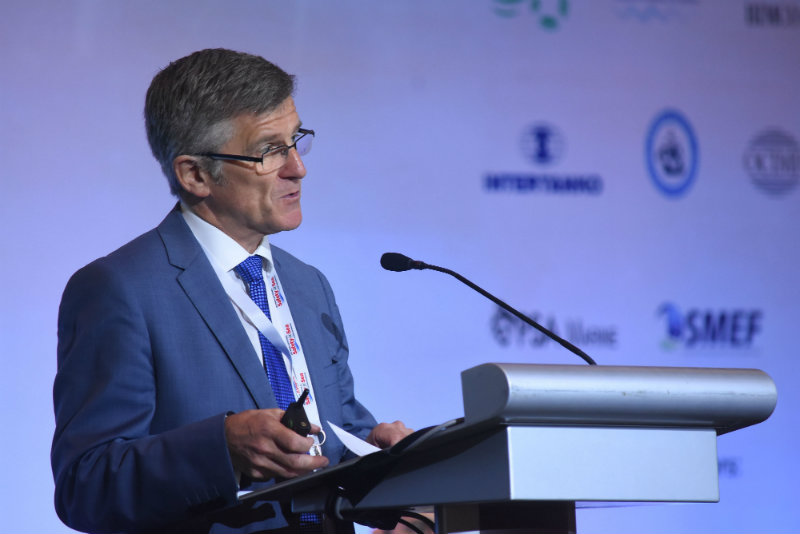
Singapore Maritime Port Authority International Safety@Sea Conference
OCIMF Director Andrew Cassels was invited to speak at the Singapore Maritime Port Authority’s inaugural International Safety@Sea conference.
Organised by the Maritime and Port Authority of Singapore, the conference is a platform for industry practitioners from different sectors of the maritime industry to share best practices on safety at sea. The keynote speakers were the Singapore Minister for Transport Khaw Boon Wan and the IMO Secretary-General Kitack Lim. Secretary General Lim gave a speech entitled Building a Resilient Safety@Sea Culture.
Andrew spoke on the importance of running a safe operation, day-in-day-out emphasising that safety is not a luxury, it’s a necessity. Andrew then moderated a session on ‘Harmonising a Global Approach to Safety at Sea through Collaboration, Standardisation and Technology’. On the panel were Aron Sørensen, Chief Marine Technical Officer at BIMCO, Ian Offland, Safety and Marine Assurance Director at Swire Offshore and Amit Pal, Director Operations at AET Ship management.
Minister Boon announced several new initiatives to promote Safety at Sea. Firstly, a jointly developed a safety video with the maritime authorities of Indonesia and Malaysia to help mariners navigate safely through the Singapore Strait. Secondly, to reduce the incident risk for smaller vessels, Singapore has made it mandatory for all power-driven harbour and pleasure craft within our waters to be fitted with IMO-compliant Automatic Identification System-B (AIS-B) transponders and electronic chart systems. Thirdly, to raise passengers’ awareness of safety procedures on board ferries, MPA is producing a safety video to be shown at ferry terminals for passengers’ viewing while they wait to board their ferries.
His key note announcement was to inform that MPA will be establishing a ‘Community of Practice’ – a collaborative platform for international maritime administrations and other non-governmental organisations to come together to share knowledge and best practices.
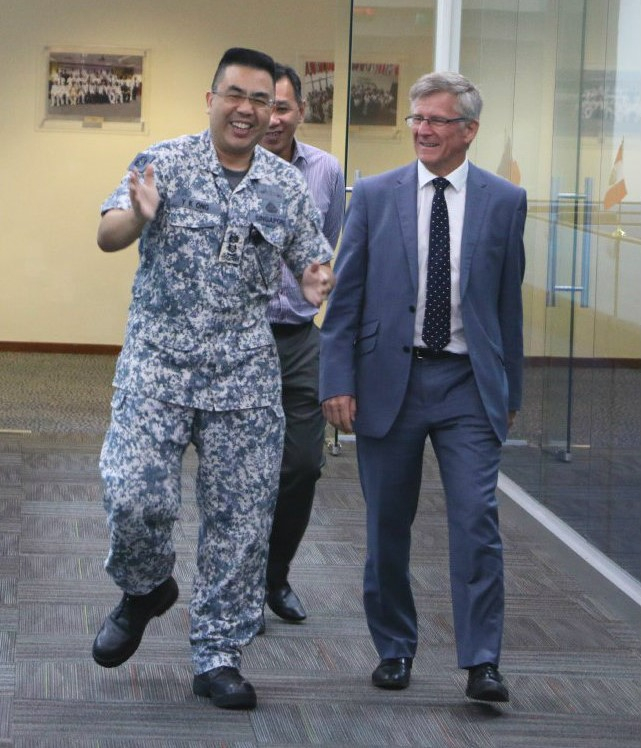
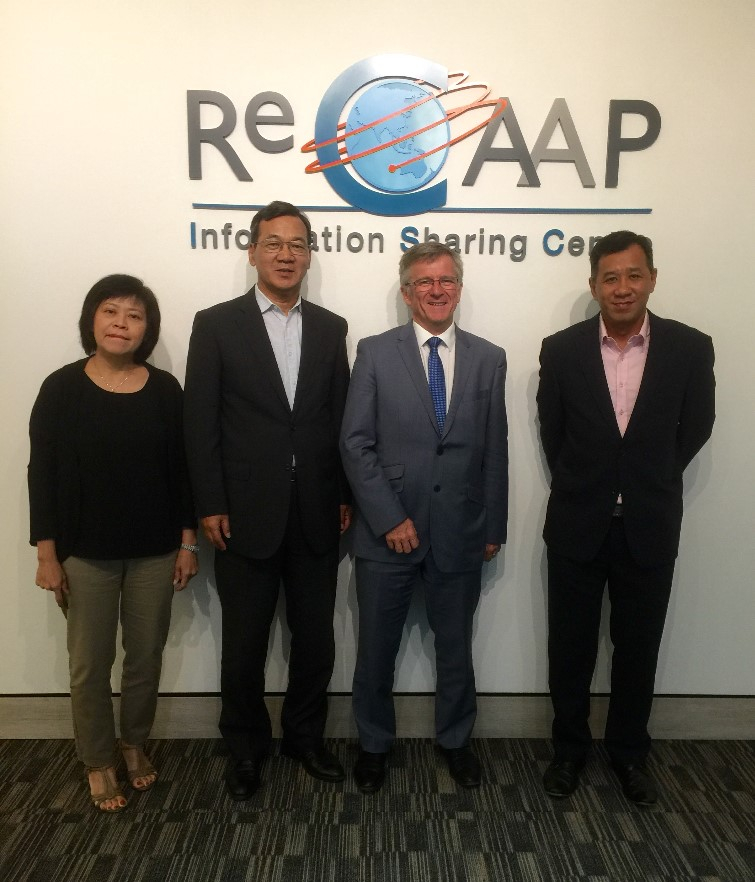
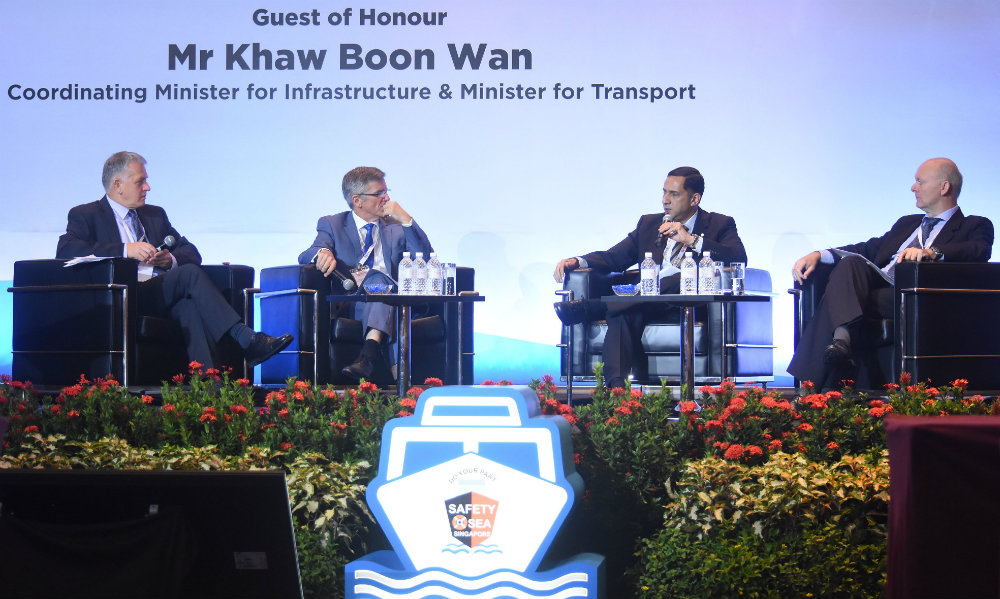
Ballast Water Management Convention
The Ballast Water Management Convention (BWM Convention) will enter into force on 8 September 2017.
Accession by Finland tipped the Convention over the 35% of the world’s tonnage required for it to be ratified.
Further details are available in the IMO Press Release. Questions may be sent to OCIMF Deputy Director Jeremy Hudson at This email address is being protected from spambots. You need JavaScript enabled to view it..
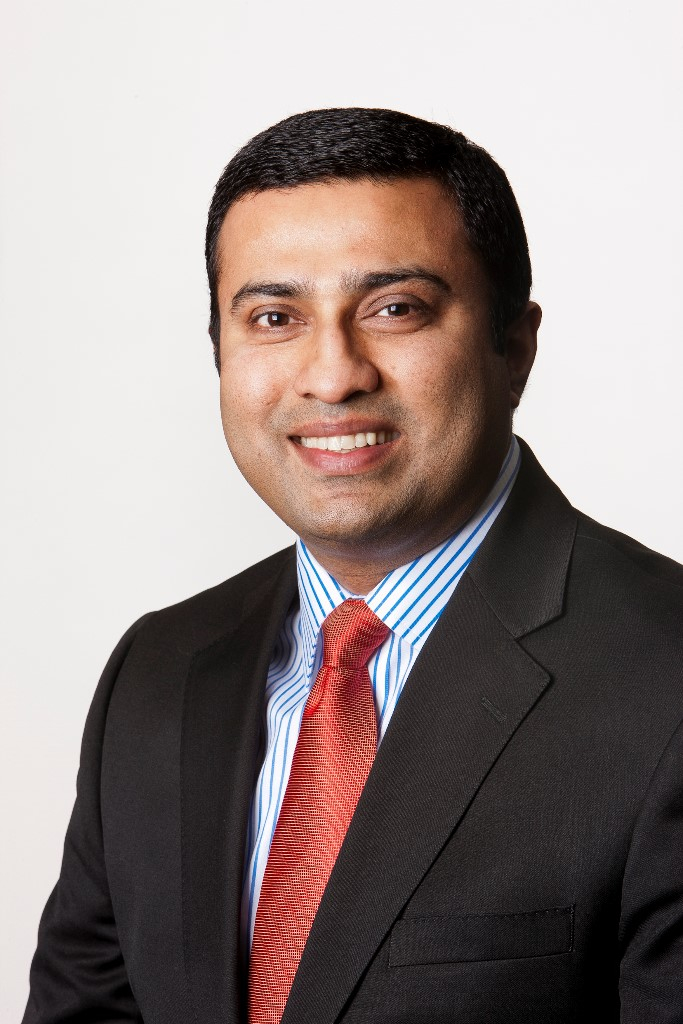
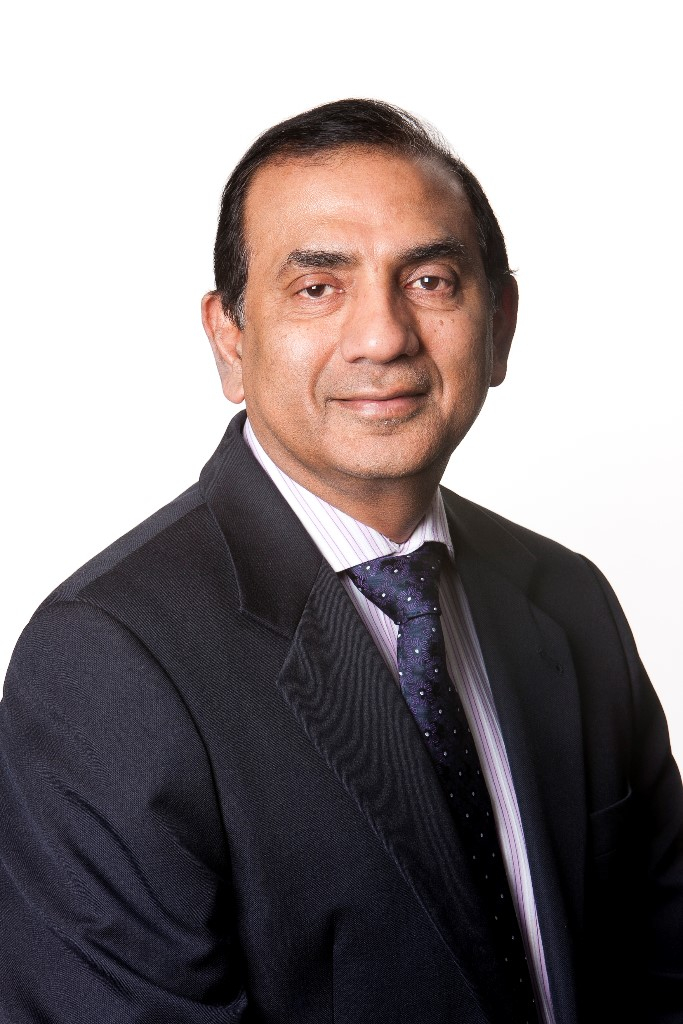
Goodbye Raj and Rahim
This month sees us bid a fond farewell to both Shaikh Rahim and Raj Shetty.
Rahim has spent the last 4 years at OCIMF as Compliance Manager, following on from a previous secondment to OCIMF as Nautical Adviser from 2008-2011.
Raj too has been at OCIMF for 4 years, in the role of Senior Technical Adviser.
We would like to take this opportunity to thank Rahim and Raj for their dedication and expertise whilst at OCIMF. We wish them both well in their future roles
Patrick McGroggan joins OCIMF

Patrick joins the OCIMF Secretariat on a three-year secondment from ConocoPhillips.
He takes over as Compliance Manager from Shaikh Rahim, who is returning to ExxonMobil.
Patrick had more than 20 years sailing on oil tankers, breakbulk, bulkers, Roll on Roll Off (RORO) and survey vessels, before joining ConocoPhillips ashore. He began his onshore career in the ConocoPhillips Marine Risk Management team providing suitability guidance on tank vessels, barges and terminals while also acting as a SIRE inspector and quality assurance auditor. In his most recent role as Logistics and Operations Lead within a joint industry project to enhance industry subsea well response capabilities, Patrick established eight shore-based locations for emergency response equipment in six countries. He has written and contributed to a range of industry subsea well containment guidelines covering emergency mobilisation logistics, mutual aid, SIMOPS and response vessel selection.
Please join us in welcoming Patrick to OCIMF
General Purposes Committee
The 83rd meeting of the General Purposes Committee (GPC) was held in Houston, Texas from 20 to 21 September.
The meeting was attended by 23 members, as well as 3 OCIMF Secretariat staff and 2 Guest speakers, from the US Coast Guard (USCG) and US Maritime Resource Centre. The representatives enjoyed two full days of discussions covering:
- Strategic issues.
- Emerging issues.
- Output from other committees, subcommittees and working groups.
- Updates from the International Maritime Organisation (IMO), maritime administrations and publications.
- Recent industry incidents.
- Presentations from guest speakers regarding Galveston Bay Coast Guard operations and cyber security.
Our thanks go to all those who attended for the full, engaging and rewarding discussions which made the meeting a resounding success.
The next meeting of the GPC will take place in London from 28 to 29 March 2017.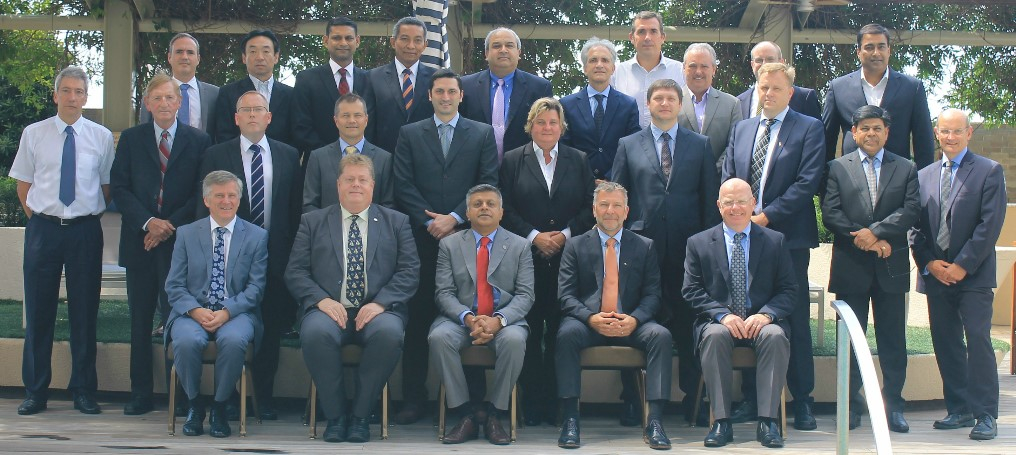
The General Purposes Committee. From left to right: Back Row – Vincent Roullet (Engie); Yuzuru Sato (PIMA); Arthur Sequeira (Phillips 66); Paulo Cruz (Petrobras); Imran Khan (Excelerate); Francesco Paturzo (ENI); Pierre Decarpigny (Total); Andrew Smiley (Koch); Jerry White (ConocoPhillips); Michael D’Souza (NLNG). Middle Row – Steve Barber (Shell/Chair SIRE focus group); Gordon DeFilippo (Marathon); Tommy Thomassen (Maersk); Kyosti Uusitalo (Neste); Gonzalo Mera Truffini (YPF); Deb Cobb (Tesoro); Maxim Tokarev (Primorsk); Ketil Johansen (Statoil); Hari Kumar (ENOC); John Barton (Shell). Front Row – Andrew Cassels (OCIMF, Director); Jeremy Hudson, GPC Secretary (OCIMF, Deputy Director); Patrick Joseph, GPC Chair (BP); Keith Trotter, GPC Vice Chair (IMT); Steve Herron, GPC Vice Chair (Chevron).
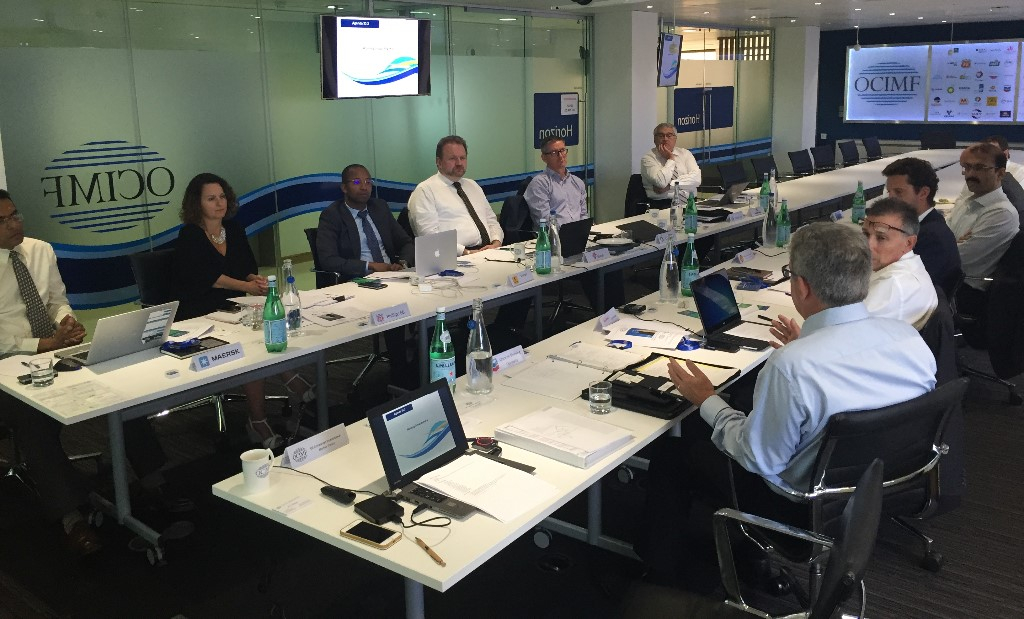
Marine Technical Sub-committee
The Marine Technical Sub-committee (MTSC) met at the OCIMF offices from 30 August to 1 September.
Nine member companies were represented and two NGOs: INTERTANKO and SIGTTO. The dinner was generously sponsored by BP.
The committee discussed and shared knowledge of subjects as varied as cylinder lube oil, arc flash safety studies and ship recycling. This last subject included discussions on The Hong Kong Convention and the European Union Directive No1257/2013. INTERTANKO and SIGTTO also provided an update on their activities.
The MTSC received progress reports from working groups on the following information papers:
Semi-continuous Hoses for Ship to Ship Transfer Operations
The International Safety Guide for Oil Tankers and Terminals (ISGOTT) does not specify any electrical continuity and discontinuity requirements for semi-continuous hoses.They are still very popular in ship to ship (STS) transfers, however, due to their light weight, flexibility and ease of use. The working group is aiming to provide more clarity and recommendations on semi-continuous hoses and their use.
Estimated completion Q4 2017.
Critical Spares Process
This aims to provide more clarity to vessel operators and Tanker Management and Self Assessment (TMSA) auditors on considerations of critical spares. The paper will not provide an itemised list, but should provide vessel operators with a means of evaluating what could be considered, taking into account considerations such as vessel trading patterns and redundancy.
Estimated completion Q3 2017.
Volatile Organic Compounds (VOC) Emissions
This paper will provide guidance on issues related to the management of VOC emissions from cargo systems on oil tankers and will address technical considerations for the selection and installation of vapour control systems. The paper will also discuss processes for managing emissions during cargo operations.
Estimated completion Q4 2017.
Work that has recently been completed by the MTSC includes:
- Guide for Implementation of Sulphur Oxide Exhaust Gas Cleaning Systems, which is available for a free download.
- Personnel Transfer by Crane, which is expected to be available for download in 2017.
The MTSC is currently made up of representatives from nine companies: Chevron, P66, Shell, ExxonMobil, Total, BP, Statoil, Maersk Oil and Sonangol. If your company is interested in becoming a member of this committee please contact OCIMF Technical Adviser Joe Megeed at This email address is being protected from spambots. You need JavaScript enabled to view it.. Please note, only OCIMF member companies are permitted.
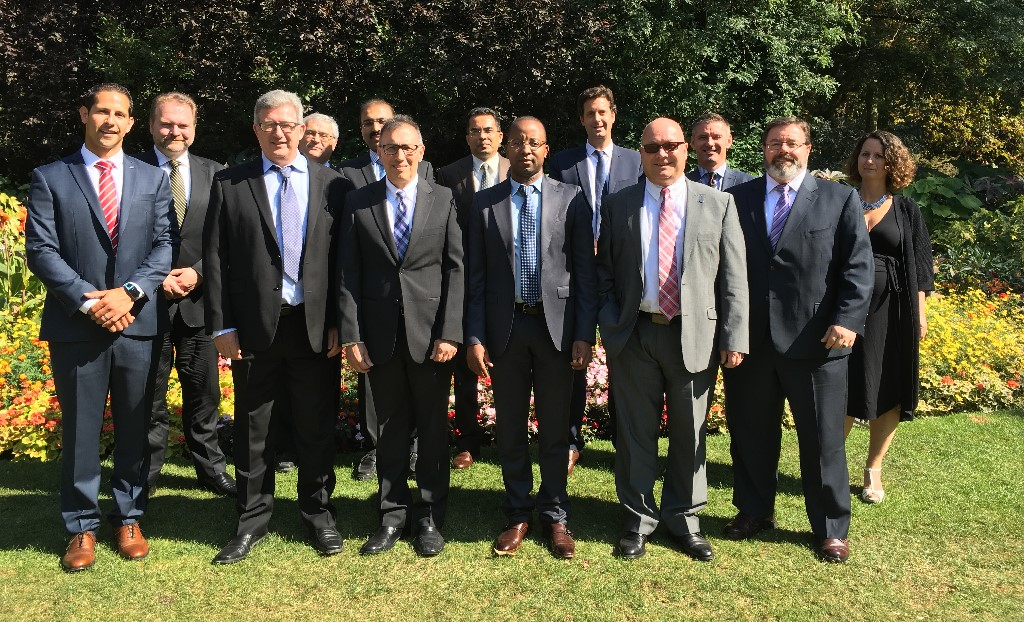
The Marine Technical Sub-committee. From left to right: Joe Megeed (OCIMF), Fred Adolfsen (Statoil), Chair David Wall (Chevron), Dragos Rauta (INTERTANKO), Ahmer Saeed (Shell), Bob Cutrona (ExxonMobil), Luis John Peter (Maersk Oil), Cataleco Luciano (Sonangol), Sebastien Roche (Total), Bobby Steele (SIGTTO), Nick Ryan (BP), Rick Boudiette (SIGTTO), Vice Chair Krystyna Tsochlas (P66). Not pictured: Kim Mikkelsen (Maersk Tankers), Laurent Bianchi (Total)
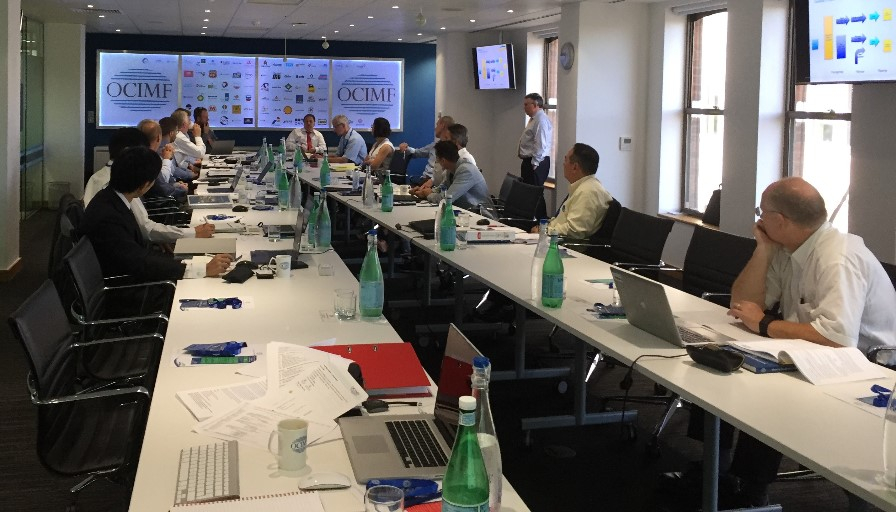
Mooring Equipment Guidelines
The Mooring Equipment Guidelines (MEG) revision working groups resumed their work in September, following a summer break.
Meetings were held of the High Modulus Synthetic Fibres (HMSF) and MEG4 working groups, and as part of the ongoing handover of work between Raj Shetty and Rob Drysdale (OCIMF Senior Advisors), an opportunity was taken to meet with the UK Marine Accident Investigation Branch (MAIB) to review progress.
Chairman Andrew Dogherty updates us on progress:
“These meetings mark the start of a busy and important period for the revision as we progress towards our goal of having a MEG4 draft ready for review by the Ports & Terminals Committee (PTC) in April 2017. The schedule is going to be tough, with meetings planned every month up to the end of the year, and a variety of milestones to reach along the way."
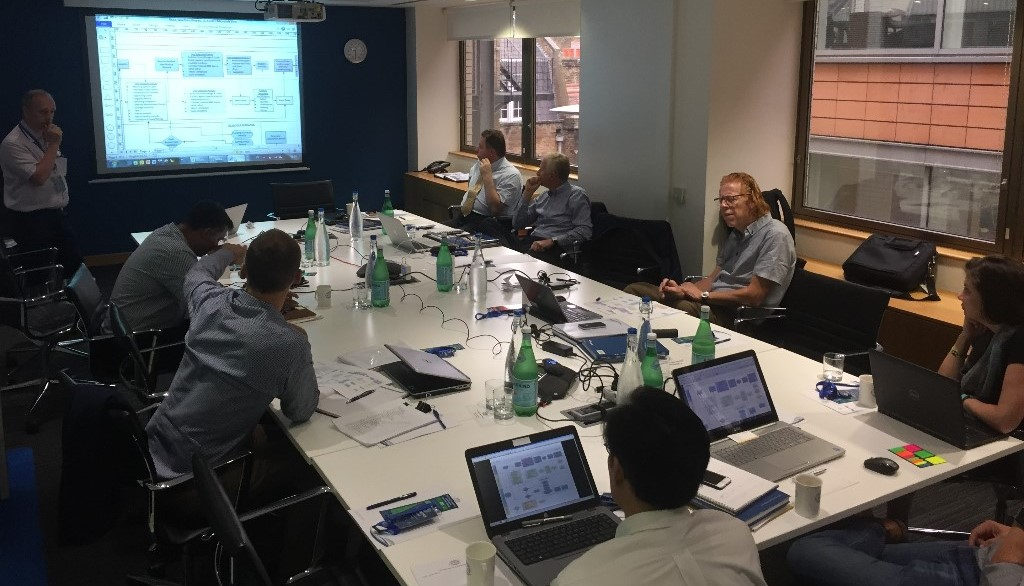
"The first of these milestones comes in October, when the work groups must complete their work identifying substantive issues for review by the MEG Steering Group. The Steering Group will consider these technical matters ahead of the Ports & Terminal Committee (PTC) in October. This will be the last full PTC meeting until April 2017, so it is vital we complete this work to schedule.
Participants have been engaging on many issues across a variety of technical fronts, including:
- The potential for development of a performance criteria for HMSF mooring lines.
- Clarification on standard terminology for assessing and comparing strength criteria across all mooring equipment components.
- The inter-relationship of MEG with other industry standards and guidance (e.g. IMO, ISO and Classification Societies).
- The role of ‘snap-back’ zones and how they are defined.
- Maintenance and inspection criteria.
- Record keeping for lifespan of equipment.
I would like to extend my thanks to all participants, whose commitment to this work has impressed not only me but also the principal inspector from the MAIB. His feedback suggests that we are progressing satisfactorily along a path that should address many of the key issues from the MAIB’s investigation of an HMSF mooring line incident. Once the MAIB report is released, the Steering Group will review it to make sure all the important findings are incorporated into MEG4.”
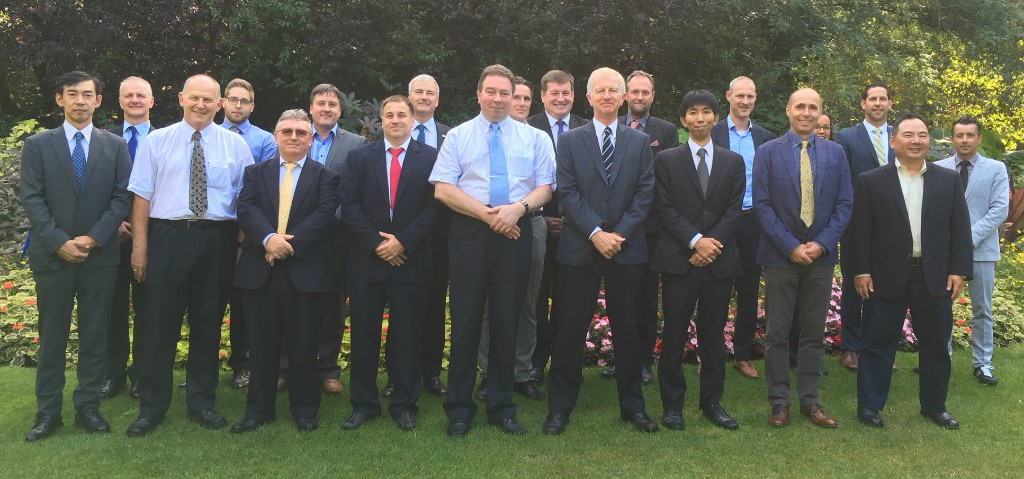
The MEG Steering Group. From left to right: Satoshi Inoue (Active Shipbuilding Experts Federation), Chris Baldwin (IMCA), Kevan McGregor (Shell), Martin Hoffman (MacGregor/Hatlapa), Martin Shaw (MOAMS), Mark Thompson (Essar Oil), Nelson Bourgon (ConocoPhillips), Rob Drysdale (OCIMF), Ian Chadwick (Chevron), Joppe Burgers (IAPH), Tony Wynne (OCIMF), Andy Dougherty (Maritime Safety Matters), Johan Gahnstrom (INTERTANKO), Hiroyuki Uchibori (Active Shipbuilding Experts Federation), Peter Bos (Shell), Steve Banfield (TTI), Julie Tallot (Total), Joe Megeed (OCIMF), Rod Iwashita (PIANC), Giovanni L'Imperio (ENI).
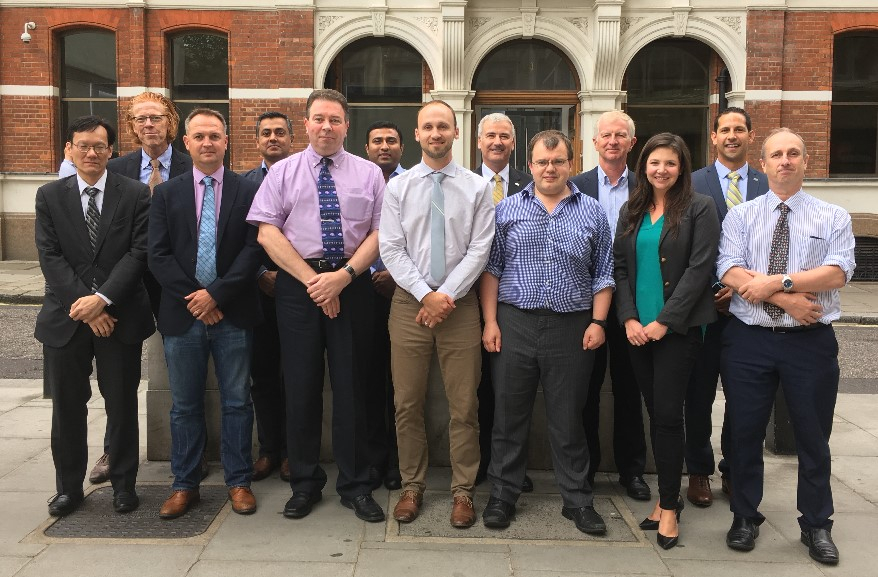
The HMSF working group. From left to right: Rod Yam (IACS/ABS), Jac Spikers (Dyneema), James Mackay (TTI), Ajay Gour (INTERTANKO), Ian Chadwick (Chevron), Raj Shetty (OCIMF), Kris Volpenhein (Samson), Rob Drysdale (OCIMF), Tim Hunter (Eurocord), Andy Dougherty (MEG Steering Group Chair), Amy Jenkins (Cordage Institute/Teijin), Joe Megeed (OCIMF), Chris Snape (Shell).
Maritime Security Sub-committee
The Maritime Security Sub-committee (MSSC) held its third meeting on 22 September in Houston, USA.
The meeting of eight members was chaired by David Bancroft (Chevron) with Vice Chair John Evans (Shell). A wide-ranging agenda focussed on two important and developing security issues: the future of the series of publications ‘Best Management Practice’ and the approach to armed guards on merchant ships.
The committee were delighted to receive a presentation from Cdr Simon Hwang of the US Navy. Cdr Hwang is the Officer in Charge of the Chicago Unit for the Naval Control of Shipping and he joined the meeting to share his experiences and some lessons he has learned from working with the maritime industry. He presented each committee member with a naval coin (right) to signify the relationship with OCIMF and said that while the military/industry partnership was in good shape, more can be done to improve the exchange of information.
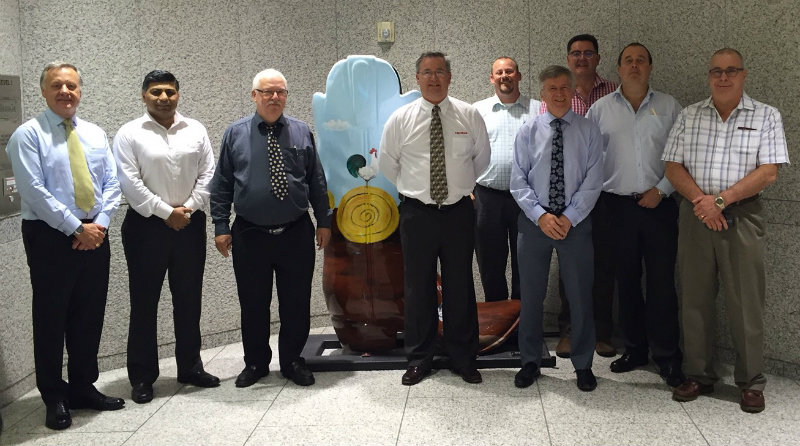
The Maritime Security Sub-committee at the Chevron office. From left to right: Russell Pegg (OCIMF); Hermant Berry (Ampol); Poul Erik Ekkendal (Maersk Tankers); Jon Pace (SeaRiver); Floyd Sanders (BP); Andrew Cassels (Director, OCIMF); David Bancroft (Chevron); John Evans (Shell); Andrias Smith (BP).
North America Inland and Coastal Barging Focus Group
The meeting was hosted in Philadelphia by Sunoco Logistics from 7 to 8 September.
This was the 10th meeting of the North America Inland & Coastal Barging Focus Group (NAICBFG). 10 members attended. The meeting covered a wide range of agenda items, including:
- Review of the Barge Inspection Questionnaire.
- Report editor issues.
- Barge Particular Questionnaire submission update.
- CAT3 Training Course.
- SIRE US Barge Inspections and Inspector issues.
- Review of Inspector training and Accreditation Guidelines.
- Barge Reports Feedback update.
- Review of revised terms of reference.
Members also discussed wider matters involving North American barge inspections and operational safety matters.
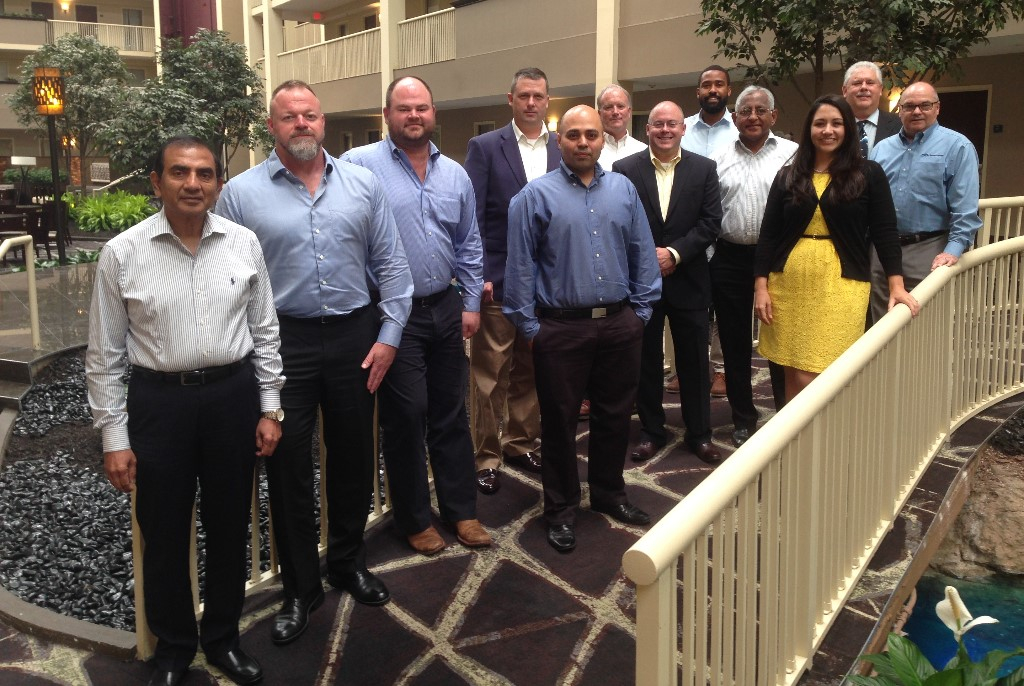
The North America Inland & Coastal Barging Focus Group. From left to right: Shaikh Rahim, Secretary (OCIMF); Patrick McGroggan (OCIMF); John Dees (Shell); Daniel Hughey, Chair (Sea River Maritime/ExxonMobil); Rajeev Saini (Chevron); Ron Waddell (Phillips66); Joe Francis (Valero); Kenneth Romney (BP); Rakesh Bajaj (Marathon); Ashlee Gatusso (TESORO); Steve Carr (Nustar); Mike Nesbitt (Sunoco Logistic).
Offshore Vessel Inspection Database focus group
OCIMF hosted the 13th meeting of the Offshore Vessel Inspection Database (OVID) focus group from 8 to 9 September.
9 Members attended and discussed the following:
- Monitoring the OVID accredited inspector pool and compliance with minimum inspection requirement because of a downturn in the market.
- Developments to the OVID Programme, including the creation of a new category of user (OVID Programme Recipients) and a new platform for vessel inspection requests.
- Improving quality of reports submitted by inspectors.
- Updating the Offshore Vessel Particulars Questionnaire (OVPQ).
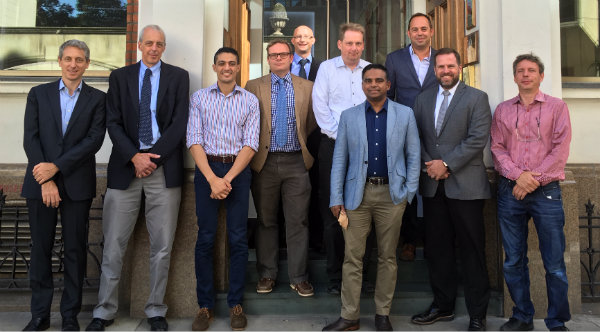
The OVID focus group. From left to right: Matthieu Bougeant (TOTAL); Graeme Gardner (Exxon/IMT); Aziz Benbelkacem (OCIMF); Ian Soady (BP); Jim Perkin-Ball (MIS); Jens J. Ladegaard (Maersk); Delon Fonseca (INPEX); Aaron Cooper (Chevron); Alex Van Dusen (OCIMF); Henning Hjartholm (Statoil)
Offshore Maritime Operations Group
OCIMF hosted the 12th meeting of the Offshore Maritime Operations Group on 6 September.
12 members attended and discussed the following:
- Dynamic Positioning Operator (DPO) training schemes.
- Current IMO discussions including revision of MSC 645 and OSV Chemical Code.

The Offshore Maritime Operations Group. From left to right: Jens J. Ladegaard (Maersk); Graeme Gardner (Exxon/IMT); Matthieu Bougeant (TOTAL); John Kaighin (Shell); Andy Goldsmith (IMCA); Chris Dixon (Bourbon); Guy Butler (MMA), Aaron Cooper (Chevron); Ian Soady (BP); Bob Byers (Tidewater); Alex Van Dusen (OCIMF); Mark Ford (IMCA); Derek Leiper (MSF/Vroon).
